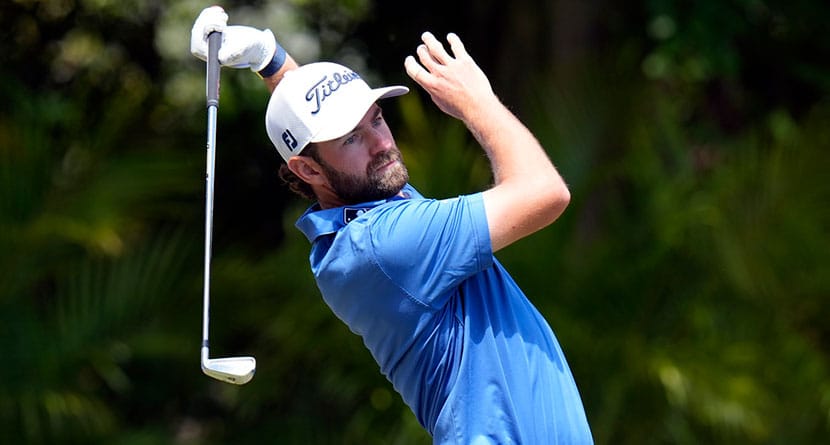David Duval was headed to the California desert for the next PGA Tour Champions event when something in his news feed caught his attention. Cameron Young has seven runner-up finishes on the PGA Tour in the last 40 years, the most of anyone who had never won.
The phrasing made it sound as if Young had set a record, and Duval didn’t think that was right. Because three decades ago, the news item could have been about him.
“Wasn’t it seven for me?” he asked.
Duval was runner-up to Greg Norman and Tom Watson at the Memorial in consecutive years, to Mark O’Meara and Peter Jacobsen at Pebble Beach, along with second-place finishes in Canada, Atlanta and the Bob Hope Classic. So yes, that adds to seven.
Young joined him on Sunday in the Valspar Championship. He was tied for the lead until Peter Malnati hit 5-iron to 6 feet for birdie on the par-3 17th. Young, playing in the group ahead, made it easier for Malnati with a wild tee shot, a decent recovery and a three-putt bogey from 50 feet to finish two shots behind.
That was his seventh runner-up finish, and he can only hope there are more comparisons with Duval before long.
“He’s lucky — he tied a good player,” Duval said. It was a sardonic boast, yes, but also a reminder to Young — whom he has never met — that silver medals don’t tarnish talent.
Duval went 75 starts from his rookie year in 1995 before he finally broke through at the end of his third season. He then won 13 times over his next 79 starts, including the 2001 British Open, the best Sunday 59 in history and two stints at No. 1 when Tiger Woods was in his prime.
All he knows about the 26-year-old Young is what he sees on TV — that rhythmic takeaway, the pause at the top and a swing that looks like it can rip the urethane off his Pro V1.
But he can appreciate the impatience and frustration when the chatter is more about the talent than the trophy.
“Once you realize as a player that you’re doing everything you can and you don’t have to do anything different, it opens up the gates,” Duval said. “You feel like you have to win. But really you’ve just got to play.”
Young has never had a 54-hole lead when finishing second. He also doesn’t have a final round over par in those opportunities. One loss was in the Dell Match Play last year, when he took out Rory McIlroy in the semifinals before running into the hot putter of Sam Burns.
Most crushing were the majors in 2022. He took a double bogey from the bunker on the 16th hole at Southern Hills in the PGA Championship and finished one shot out of a playoff. “One of those times I’m going to shoot 5 under on the back and that’s going to be good enough,” he said that day.
Two months later, Young shot 31 on the back nine at St. Andrews. Cameron Smith shot 30 and beat him by one in the British Open. That was runner-up No. 4 for Young.
He now can be called the best player on the PGA Tour without a victory — Tommy Fleetwood gets a mention, but those seven European titles count mightily in a global game — and it’s starting to wear on Young.
Young doesn’t say a lot, but he gets straight to the point. So when he was asked Saturday evening at Innisbrook how he has stayed patient while chasing his first win, Young bluntly replied, “I haven’t, really.”
“I’ve definitely let it get to me at times,” Young said. “I feel like right now I’m in a really nice place mentally. I’ve had really good control over my thoughts and emotions this week. They have definitely got the better of me at times, but I feel like I’m in a really nice place and I’m just trying to hit each shot the best I can.”
Runner-up No. 6 for Duval came at Pebble Beach in 1997 when he tied for second with Woods at 19-under par, a score that would have won the previous 55 editions of the tournament except for O’Meara posting at 20 under.
A month later, Duval was asked if he was more tired from getting asked about not winning or from not having won.
“I’m not tired of either,” he said. “Because if I wasn’t asked about it, I’d feel like maybe people don’t think very highly of me as a player. But seeing as I’m asked a lot, that shows that a lot of people out here believe in my abilities. And so that’s a good thing. That’s a good feeling.”
That might be the soundest advice for Young.
Young isn’t doing everything right — a putt here, a fairway there — or he would have won by now. He’s not doing a lot wrong, either. His scoring average in his six runner-up finishes in stroke play is 67.5.
He was proud of some of the shots he took on, and mostly how he kept his head clear of everything but the next shot.
“I think I handled my own thoughts really well, and for me, that’s a big win regardless of the outcome,” he said, before leaving Innisbrook with little more than another close call.




